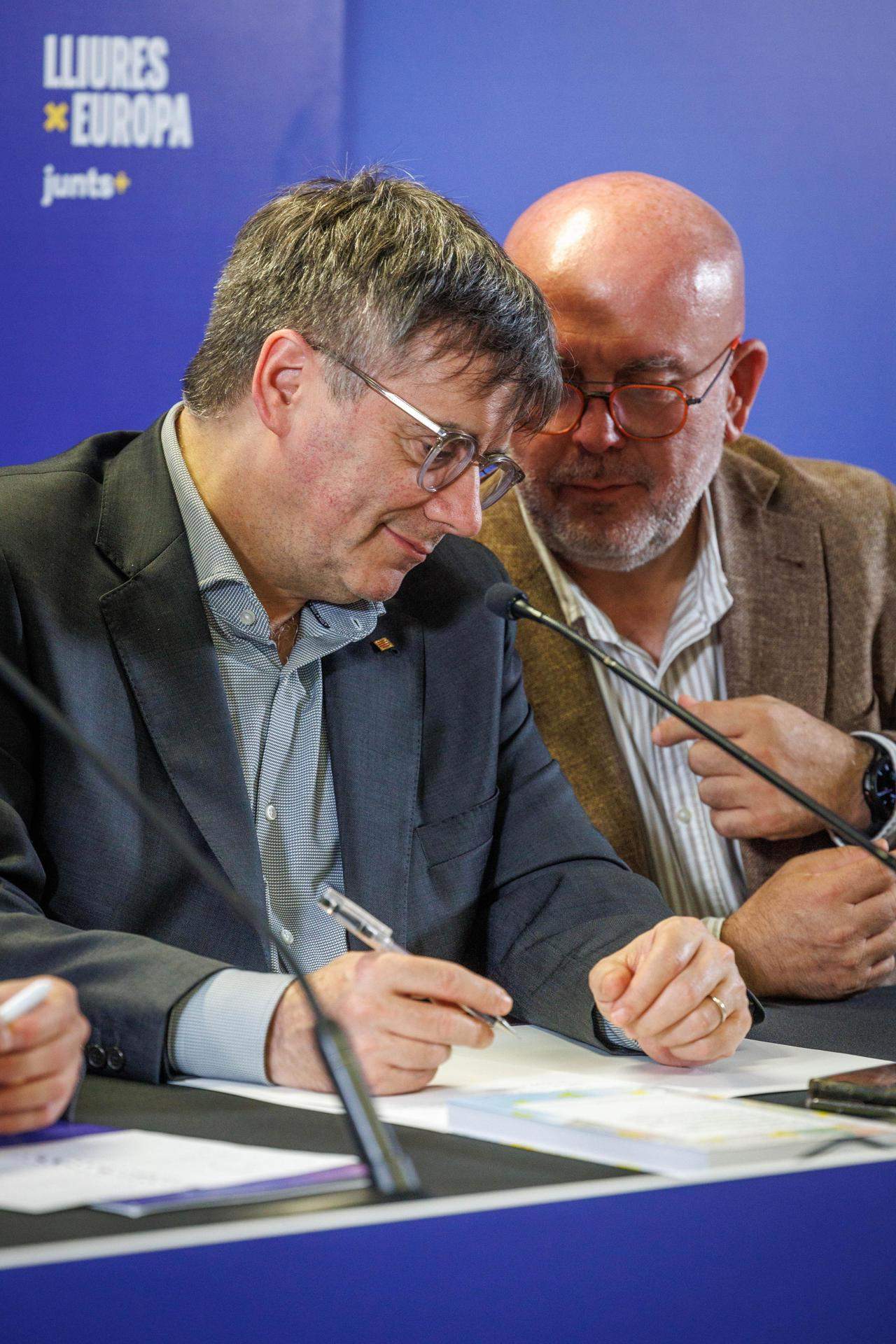A defence of exile. The Together for Catalonia (Junts) list leader for the European Parliament, Toni Comín, appeared this Friday together with Carles Puigdemont and the lawyer Gonzalo Boye to defend the work done by the Catalan politicians in Euroepan exile and the impact it had on the passing of the amnesty law. Puigdemont affirmed that the "strategic litigation" carried out by the exiled politicians has meant that "the perimeter with which the Spanish state can act against political dissidents is much narrower than in 2017, when they had free range". Boye went even further and asserted that "without the exile there would be no amnesty today".
"The amnesty has been won in parallel with the success of exile. And it is a success because we haven't been left without those we are defending", responded the lawyer, who related how on October 29th, 2017, when he took on the legal defence of the exiles, they laid the foundations of the political strategy and how the exiled politicians would maintain their position. "This was not the easy way to go, the easy way was another. If they had not been willing to persist, the strategy would have been different. We would not have managed to close that circle", he said.
Among other developments, Boye recalled how when he defended the exiles before the European Court of Justice he did so by identifying them as representatives of the "Catalan national minority", which later gave rise to a judgment in which the Luxembourg court contemplated the existence of what it described as an Objectively Identifiable Group: another European country, said the court, might have grounds for refusing to execute a European Arrest Warrant if there were "deficiencies" towards an "objectively identifiable group" in the justice system of the country seeking the deportation.

Intelligent confrontation
He warned that the battle is not over and will continue after the parliamentary approval of the amnesty. In this regard, he referred to the fact that the Socialist government is retaining the text approved by Congress instead of sending it straight on to the head of state for its signature and publication, and how Spanish prosecutors have dedicated public resources to the drafting of a document to reject an "unborn law". "This is making a fool of one's self", he reprimanded, equating these actions to those that occurred relative to exile in Germany and Belgium, when the respective courts decided not to arrest Puigdemont, at which point Spain began to lose the battle.
Puigdemont also affirmed that "this strategy of intelligent confrontation must continue". "This is not over, it must continue, and we are more enthusiastic, because it works. No matter how long it takes, this is the road that we will not stop walking", warned the pro-independence leader, who underlined the poor transposition of European directives that characterizes the Spanish government to point out that "the time has come to litigate in this area and do it in the first division" from the Catalan government.
Exile was not looking for easy ways out
The meeting allowed the pro-independence leader to evoke the path taken by the exiled politicians on a path that was not without difficulties and tough moments. "We did not come into exile to look for easy solutions or to remedy personal situations, but to use our case on behalf of a government and a parliament that was unjustly dismissed in the general case against the Catalans", he said. This set in motion this "intelligent confrontation" which at the time was like "scraping a wall that looked like reinforced cement". According to Puigdemont, this route required entering "unknown" terrain, without maps, but knowing that if they did things right they could get out; innovating and opening a way in some litigation.
Toni Comín opened the event, admitting that none of the milestones achieved by Catalan exile would have been possible without Gonzalo Boye. He explained how they got in touch with Boye, from Northern Catalonia (France) when they decided to go into exile, through Jaume Asens, and how they set the goal of avoiding extradition as their first condition. He recounted episodes such as the judicial victory in Belgium and Germany, which he attributed to the criminal and legal expertise of Boye and Isabel Elbal. "Avoiding extradition was not only to prevent us from being extradited, but to show up that the Spanish state was not acting in a way acceptable to the rest of Europe. So they were not personal victories, they were political, collective victories," he affirmed.

